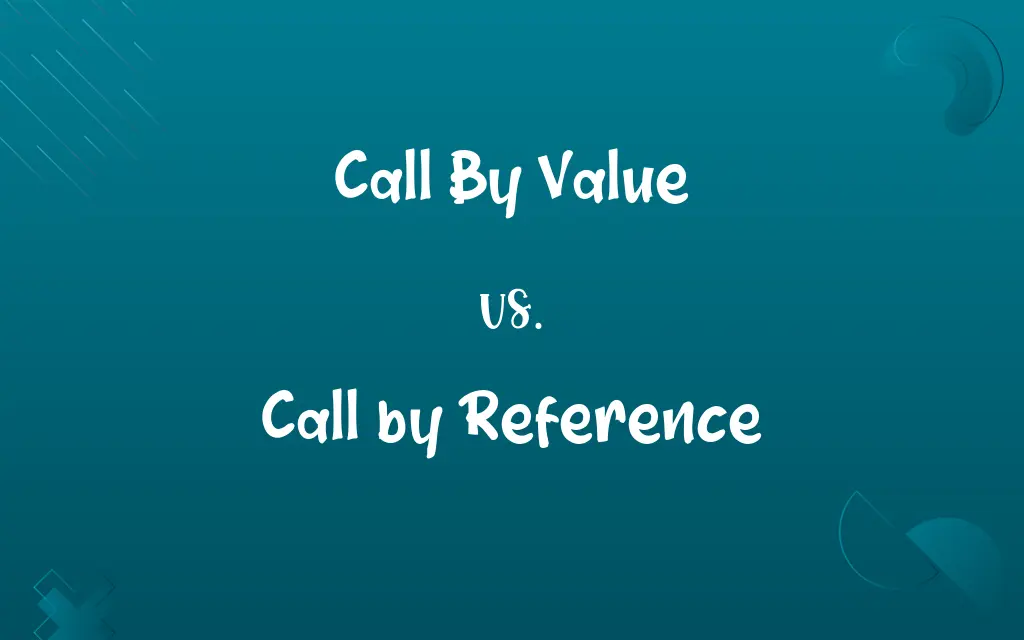Call By Value vs. Call by Reference: Know the Difference

By Shumaila Saeed || Published on February 25, 2024
Call By Value copies the value of an argument into a function's parameter, while Call by Reference passes the argument's reference, allowing the function to modify the original variable.

Key Differences
Call By Value in programming means that a copy of the actual value is passed to the function. Changes made to this value in the function do not affect the original variable. In contrast, Call by Reference passes the address of the variable, allowing the function to modify the original variable.
Shumaila Saeed
Feb 25, 2024
With Call By Value, a separate memory space is created for the variables in the function, ensuring that the original values remain unchanged. On the other hand, Call by Reference uses the same memory address for the original variable, meaning changes in the function reflect in the original variable.
Shumaila Saeed
Feb 25, 2024
Call By Value is generally safer as it prevents accidental changes to the original data. However, Call by Reference is more memory efficient as it doesn't create a copy of the variable.
Shumaila Saeed
Feb 25, 2024
In Call By Value, the process of copying values can be less efficient for large data structures or objects. In Call by Reference, since only a reference is passed, it is more efficient for large data structures.
Shumaila Saeed
Feb 25, 2024
When using Call By Value, the function works with its own set of data. Conversely, Call by Reference can lead to side effects where the function's actions inadvertently alter the state of the external variables.
Shumaila Saeed
Feb 25, 2024
ADVERTISEMENT
Comparison Chart
Memory Usage
Creates a copy, using more memory
Uses existing memory, more efficient
Shumaila Saeed
Feb 25, 2024
Effect on Original Data
Does not affect original data
Can modify original data
Shumaila Saeed
Feb 25, 2024
Safety
Safer, no unintended changes to data
Less safe, changes affect original data
Shumaila Saeed
Feb 25, 2024
ADVERTISEMENT
Call By Value and Call by Reference Definitions
Call By Value
Passing a copy of the value to a function.
In Call By Value, changing the parameter inside the function doesn't affect the original variable.
Shumaila Saeed
Jan 23, 2024
Call by Reference
A method where a function can alter the original variable.
He used Call by Reference to efficiently update the values in a large data set.
Shumaila Saeed
Jan 23, 2024
Call By Value
Function receives a copy of the variable, preserving the original.
Call By Value is preferred when the integrity of the original data is crucial.
Shumaila Saeed
Jan 23, 2024
Call by Reference
Function receives an address pointing to the original variable.
Call by Reference is used when a function needs to make changes directly to the passed variable.
Shumaila Saeed
Jan 23, 2024
Call By Value
Method of passing arguments that prevents external changes.
He chose Call By Value to avoid any accidental modifications to his variables.
Shumaila Saeed
Jan 23, 2024
ADVERTISEMENT
Call by Reference
Passing arguments by their memory location.
Call by Reference was chosen for its efficiency in handling large objects.
Shumaila Saeed
Jan 23, 2024
Call By Value
A method where the actual value is passed, not the reference.
Using Call By Value ensures that the function's operations do not alter the source data.
Shumaila Saeed
Jan 23, 2024
Call by Reference
A way of parameter passing that enables direct modification.
In complex algorithms, Call by Reference can significantly reduce memory usage.
Shumaila Saeed
Jan 23, 2024
Call By Value
A way of parameter passing where the original variable remains unaffected.
Functions using Call By Value are often used in scenarios where data protection is vital.
Shumaila Saeed
Jan 23, 2024
Call by Reference
Passing the reference of a variable to a function.
Call by Reference allowed the function to directly modify the array's contents.
Shumaila Saeed
Jan 23, 2024
Call By Value
(programming) An evaluation strategy in which the arguments to a function are evaluated first, and the result is passed into the function.
Shumaila Saeed
Jan 22, 2024
Call by Reference
(programming) An evaluation strategy in which the arguments to a function are evaluated first, and a pointer to the result is passed to the function.
Shumaila Saeed
Jan 22, 2024
Repeatedly Asked Queries
Can Call By Value change the original variable?
No, it works on a copy, leaving the original unchanged.
Shumaila Saeed
Feb 25, 2024
What is Call By Value?
It's a method where a copy of a variable's value is passed to a function.
Shumaila Saeed
Feb 25, 2024
Does Call by Reference modify the original data?
Yes, changes in the function affect the original variable.
Shumaila Saeed
Feb 25, 2024
Is Call by Reference memory efficient?
Yes, as it doesn't create a copy of the variable.
Shumaila Saeed
Feb 25, 2024
What does Call by Reference mean?
It involves passing a variable's reference to a function, allowing direct modification.
Shumaila Saeed
Feb 25, 2024
How does Call by Reference handle large objects?
More efficiently, as it passes just a reference.
Shumaila Saeed
Feb 25, 2024
Can Call By Value cause side effects?
No, it's isolated from the original data.
Shumaila Saeed
Feb 25, 2024
Are there side effects in Call by Reference?
Yes, functions can unintentionally change original data.
Shumaila Saeed
Feb 25, 2024
When is Call By Value preferred?
In scenarios where data integrity is critical.
Shumaila Saeed
Feb 25, 2024
How does Call By Value affect memory usage?
It uses more memory due to copying the variable.
Shumaila Saeed
Feb 25, 2024
Is Call By Value slower for large objects?
Yes, due to the time taken to copy large data.
Shumaila Saeed
Feb 25, 2024
Where does Call by Reference store data?
It directly accesses data in its original memory location.
Shumaila Saeed
Feb 25, 2024
Are there risks with Call By Value?
Less risky, but less efficient for big data.
Shumaila Saeed
Feb 25, 2024
How do languages that default to Call By Value handle large data efficiently?
They may offer features like references or pointers to optimize memory usage.
Shumaila Saeed
Feb 25, 2024
What are the risks of Call by Reference?
Potential unintended modifications to original data.
Shumaila Saeed
Feb 25, 2024
Is Call By Value suitable for all data types?
Generally yes, but less so for large structures.
Shumaila Saeed
Feb 25, 2024
Can you force Call By Value in languages defaulting to Call by Reference?
Yes, by explicitly passing copies of variables.
Shumaila Saeed
Feb 25, 2024
Does Call By Value use the stack or heap memory?
Typically, it uses stack memory for the copies.
Shumaila Saeed
Feb 25, 2024
When is Call by Reference not advisable?
When data integrity must be strictly maintained.
Shumaila Saeed
Feb 25, 2024
Share this page
Link for your blog / website
HTML
Link to share via messenger
About Author
Written by
Shumaila SaeedShumaila Saeed, an expert content creator with 6 years of experience, specializes in distilling complex topics into easily digestible comparisons, shining a light on the nuances that both inform and educate readers with clarity and accuracy.







































































